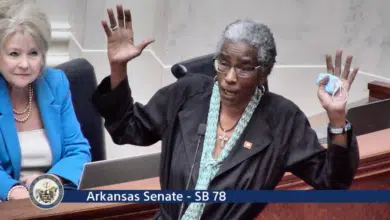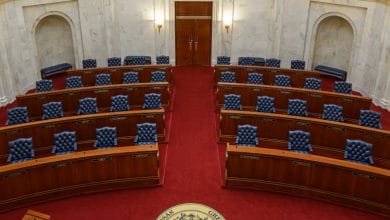Week 5 Summary of Conduit Bill Analysis (see Details Below):
OPPOSE
SB207 – Increased Franchise Taxes; Banning Businesses from Doing Business – OPPOSE
SB233/SB234/SB235 – Promoting Election Fraud and Cheating – OPPOSE
SUPPORT
HB1360 – Electrician Services Deregulation – SUPPORT
HB1382 – Tax Credits for Re-Entry to Work – SUPPORT
HB1399 – Publication Requirements Reform for Cities and Counties – SUPPORT
SB197 – Protection of Private Property Rights Against Local Regulations – SUPPORT
SB206 – Partisan School Board Elections at General Elections with 2-Year Terms – SUPPORT
SB231 – Cooling Off Period for Legislators to Become Lobbyist-Consultants – SUPPORT
Bill Details:
HB1360 – Electrician Services Deregulation – SUPPORT
By: Rep. Richard McGrew & Sen. Matt McKee
This bill would allow residential journey electricians to provide electrician services to single family homes, duplexes, triplexes, and quadraplexes instead of just one- and two-family dwellings. This should increase the supply of electrician services while also expanding experience for service providers—in short, allow the customer more options while allowing more freedom within this occupation.
HB1382 – Tax Credits for Re-Entry to Work – SUPPORT
By: Rep. Robin Lundstrum & Sen. Breanne Davis
This bill would create a new income tax credit program for employers who hire ex-offenders who work at least forty hours per week. Only those convicted of a state or federal felony, were incarcerated, and are hired within one year of being released will qualify. A refundable tax credit will be allowed against a person’s income taxes for (i) $3,000 if the ex-offender stays employed for an entire year; (ii) $2,000 for two years; and (iii) $1,000 for three years. Registration and reporting requirements with the Department of Workforce Services are required to get the tax credit. Ex-offenders must submit to random drug testing.
(It should be noted that this “pilot” bill includes the following requirements: only 1,000 ex-offenders may participate at one time; the ex-offender must be drug tested; and during the first two years of employment, he or she must be enrolled in Arkansas’ Medicaid Expansion Program-Arkansas Works, and in the third year be included in the employer’s health insurance plan, if eligible. While we assume these government regulations are an attempt by the legislature to relieve an employer of some of the inherent risks, it will be perceived by many that this bill adds layers of unnecessary government restrictions and costs on the employer, the employee, as well as the taxpayer–which may prove to ultimately erase the bill’s intended benefits.)
HB1399 – Publication Requirements Reform for Municipalities and Counties – SUPPORT
By: Rep. Fran Cavenaugh & Sen. Scott Flippo
Municipalities. This bill would allow municipalities to publish official notices (such as those for elections, public meetings, or financial statements) on a public website instead of requiring them to pay and publish in a printed newspaper.
Nothing in the bill prohibits municipalities from continuing to publish with local newspapers but gives them the option to fulfill legal publishing requirements by posting online.
With the near disappearance of local and state-wide newspapers (as well as their high costs of publication), this will allow flexibility for a municipality to get their notices to people in the most accessible form, including continuing what currently exists, which allows the municipality to use the simple posting of the notice in two or five (depending on notice type) of the most public places designated by the governing body.
Failure by the municipality to following these posting requirements will be a defense to any prosecution of fines imposed.
This bill could save municipalities significant money to put towards other services for their constituents.
See the 12 months of publications requirement below which advises its citizens of notices going online.
Counties. This bill requires counties to publish official notices (such as those for elections, tax delinquent taxpayers, or public meetings) on a public website established for such purposes instead of requiring them to pay and publish in a printed area wide newspaper.
Unlike the municipalities, this bill no longer allows public notices from counties to be printed in the newspaper. The publication of the notice online is to remain on the public website for three years, although failure to remain posted for three years is not a legal defense to prosecution of the consequences imposed by the ordinance under notice.
This will save the county taxpayers very large publication fees while also enabling its citizens and taxpayers to receive these notices in a manner consistent with other consumable information which also allows a historical reference not usually available with a printed source.
12 months of publications under Temporary SECTION 25: In an effort to make certain that the public is made aware of the switch to digital online notices contained in this bill, counties and municipalities that publish notices on a website under this bill are required to run an ad in its current newspaper monthly for one year advising the public of such change, the website address, and where to otherwise receive the notice and any payment information.
State. This bill does not include any requirement that state-wide publications such as ballot initiatives, etc be published online.
SB197 – Protection of Private Property Rights Against Local Regulations – SUPPORT
By: Sen. Joshua Bryant & Rep. Brit McKenzie
This bill would protect the private property rights of people against regulations which would ban the use of their property for short-term rentals. The use of short-term rental properties, such as an AIRBNB, has increased over the past decade. Nosy neighbors and big government people saw this as an opportunity to tax, regulate, and ban what they didn’t like. This has led to local governments squashing the private property owners’ rights and banning short-term rentals. This bill would prohibit local governments from regulating the operation of a short-term rental marketplace. This will provide freedom to property owners, more choice for short-term rentals, and create additional marketplaces for people to make money and customers to enjoy traveling to new places in Arkansas.
SB206 – Partisan School Board Elections at General Elections with 2-Year Terms – SUPPORT
By: Sen. Clint Penzo & Howard Beaty Jr.
This bill would reform school board elections, terms, and partisan disclosure of school board members. School board directors would be restricted to eight consecutive years in office. Terms for school board members would move from three years to two years. School board elections would allow candidates to select a political party, letting the public and parents know to which political party the candidate is aligned. Candidates could also run as independents. While some may scream “local control” as a reason to oppose this legislation, this is the only way that these issues can be changed – by the state legislature. This provides more transparency on candidates, cuts down on lifetime school board members, and allow the public a quicker turn around period to vote out or retain specific school board directors. This will be a win for kids, parents, and the public at large with more accountability, transparency, and school choice.
SB207 – Increased Franchise Taxes; Banning Businesses from Doing Business – OPPOSE
By: Sen. Blake Johnson & Rep. Marcus Richmond
This bill would increase corporate franchise taxes by adding a “processing fee” based on the current tax value. For those taxes at $50 per year, they would owe an additional $4.00 per year. Those taxed between $51 and $167 would owe $5.00 more annually. Those above $167 would pay an additional three percent (3%) of their total franchise tax amount due. This is essentially taxing a tax. This new tax does the opposite of the recently filed business friendly HB1239 which repeals the corporate franchise tax. The bill would also prohibit businesses from operating in the state if they do not pay on time and the correct amount.
This bill also codifies the current Secretary of State rules which prohibit the person responsible for filing from filing or legally establishing new business filings/entities in Arkansas or from filing documents related to businesses already doing business. This is bad business policy for Arkansas, will raise little revenue, and will further be a poke in the eye to those trying to do business in our state.
It is time for Arkansas to join the near 40 business friendly states which have no franchise tax by saying “NO” to this bill and passing business friendly HB1239.
SB231 – Cooling Off Period for Legislators to Become Lobbyist-Consultants – SUPPORT
By: Sen. Bryan King
This bill would require legislators to wait two years before becoming a lobbyist-consultant employee or a director with a private entity whose primary purpose is lobbying an elected official. Many legislators move straight from being a legislator to becoming a “consultant” which in reality is a code word for “lobbyist.” While they do not use the word lobbyists, these consultants perform the same functions. Though already banned by law from being a registered lobbyist, this bill would go further to prohibit the hiring of recent legislators such as former Sen. Lance Eads who resigned his Senate seat in the fall of 2022 to become a lobbyist-consultant in Little Rock, who now still spends his days at the Capitol during this Legislative Session, visiting with his legislator friends.
SB233/SB234/SB235 – Promoting Election Fraud and Cheating – OPPOSE
By: Sen. Clarke Tucker
These three bills filed by the woke Senator Clarke Tucker would promote election fraud and cheating in elections. For nearly a decade, Sen. Tucker has tried to pass deceptively bad election laws which would give Democrats more power through cheating, fraud, and expanding voting day to a “voting season.”
SB233 at first glance seems like no big deal, as it clarifies absentee ballot requests and how long they last. But Tucker’s bill adds that administrators in nursing homes can take the absentee ballots of those people living in their facilities instead of it going to that person, if the administrator is authorized to do so by the voter. There is no language on how a person must authorize giving over their ballot to a nursing home administrator instead of to the voter. Tucker’s bill targets the disabled, infirm, and elderly to promote election fraud by setting up the potential for ballot harvesting among nursing home administrators. This is a recurring theme for Tucker who last session (2021), with the help of a few Republicans, pushed through a bill that would go against election integrity by allowing electronic voter registration. They even went as far as to sign it out of a committee at the last minute when it did not pass in committee.
SB234 will be presented as a non-controversial and good bill to help people vote. However, one would assume Sen. Tucker knows his language would allow each county to write whatever they want on the absentee ballot sent to voters, even if it violates state election law, which in turn will invite the potential for fraud and abuse. Again, this has the potential for Democrats to gain votes by trickery rather than convincing voters that they are the better candidate.
SB235 is long, repetitive, and confusing. Essentially it is a way to set up a process to allow for cheating in the collecting and processing of absentee ballots. It removes verification of absentee ballots and instead moves the ballots forward if the ballot materials are all present, even if not correct. It also allows near blanket authority for the State Board of Election Commissioners to write new rules to control the absentee ballot process, recordkeeping, and compliance with the Freedom of Information Act. The power of counting the vote is given to bureaucrats to write the rules instead of the people’s elected representatives.
With Sen. Tucker’s track record and recent string of filed bills and constitutional amendments which appear to promote cheating and fraud in elections, legislators would be wise to vote against any bill he presents which affect elections in Arkansas. Sen. Tucker is a member of a national party and those even within the national GOP who want to control those who procure and then count the votes rather than promoting free and accurate elections.
Status of Bills Tracked by Conduit on Weekly Scorecard Reports:
OPPOSE
HB1087 – Increased Speeding Tickets + Required Community Service – OPPOSE
STATUS: Referred to Committee; Moved to Deferred Bills on Agenda; no hearing scheduled
HB1189 – New Licensure Regulations/Penalties on Behavior Analysts – OPPOSE
STATUS: Referred to Committee; Hearing scheduled for 2/14/23
HB1237 – Increased Regulations and Costs for Ridesharing – OPPOSE
STATUS: Referred to Committee; no Hearing scheduled.
HB1275 – Banning Access to Paper Medical Records if Online Access Provided – OPPOSE
STATUS: Referred to Committee; no Hearing scheduled.
SUPPORT
HB1012 – Increased Standard Deduction – SUPPORT
STATUS: Referred to Committee; On Deferred Agenda
HB1016 – Standard Deduction Increased by Inflation; No Cap – SUPPORT
STATUS: Referred to Committee; On Deferred Agenda
HB1026 – Prohibits Cities Enacting a Local Income Tax – SUPPORT
STATUS: Passed Committee (1/26/23); Passed House (Vote); Passed Senate (Vote).
HB1027 – Required Voter Approval for New/Increased A&P Taxes – SUPPORT
STATUS: Referred to Committee; Amended 2/10/23; Hearing scheduled 2/14/23
HB1032 – Increased Homestead Property Tax Credit – SUPPORT
STATUS: Heard in committee; Chair Eaves did not allow a vote. On Deferred Agenda.
HB1067 – No Residency Requirement for Firefighters – SUPPORT
STATUS: Heard in committee; Failed on voice vote – Rep. Carol Dalby & Municipal League helped kill.
SB5 – Telehealth for Vets – SUPPORT
STATUS: Heard on 1/24/23 in Committee; Opposition from out of state academics, cattle related associations; no vote taken. Amended 2/8/23; Hearing scheduled 2/14/23.
SB42 – Deregulation on Licensed Counselors – SUPPORT
STATUS: Passed Senate (Vote); Passed House Committee; On House Calendar 2/13/23
HB1045 – Repeal of the “Throwback Rule” – SUPPORT
STATUS: Referred to Committee; On Deferred Agenda.
HB1082 – Occupational Therapist Licensing Compact – SUPPORT
STATUS: Passed House (Vote); Referred to Senate Committee; No hearing scheduled.
HB1149 – Prohibit Gifts from Lobbyists to Executive Branch Cabinet Secretaries – SUPPORT
STATUS: Withdrawn by the Author (1/25/23)
HB1155 – Increased Childcare Access – At-Home Childcare Providers – SUPPORT
STATUS: Passed House (Vote); Passed Senate (Vote); On to Governor
SB80 – Exempt Capital Gains Tax from Property Conveyed via Eminent Domain – SUPPORT
STATUS: Referred to Committee; No hearing scheduled.
HB1196 – Part Time Work Requirement for Public Housing Benefits – SUPPORT
STATUS: Passed House (Vote); Referred to Senate Committee
HB1207 – Fast Track for Local Permits – SUPPORT
STATUS: Referred to Committee; no hearing scheduled
HB1239 – Repeal of Annual Franchise Tax on Businesses – SUPPORT
STATUS: Referred to Committee; on Deferred agenda.
SB90 – Occupational Licenses Streamlined for Out of State Equivalents – SUPPORT
STATUS: Referred to Committee; Hearing scheduled 2/14/23
SB125 – Increased Free Speech Protections on College Campuses – SUPPORT
STATUS: Presented in Committee, Pulled by Sponsor due to lack of support. Amended 2/8/23; Referred to Committee.
HB1345 – Increased Tax Deduction for Teacher Classroom Expenses – SUPPORT
STATUS: Referred to Committee; On deferred agenda.
SB134 – Tax Cut on Used Vehicles, Trailers, Semi-Trailers – SUPPORT
STATUS: Referred to Committee; no hearing scheduled.






